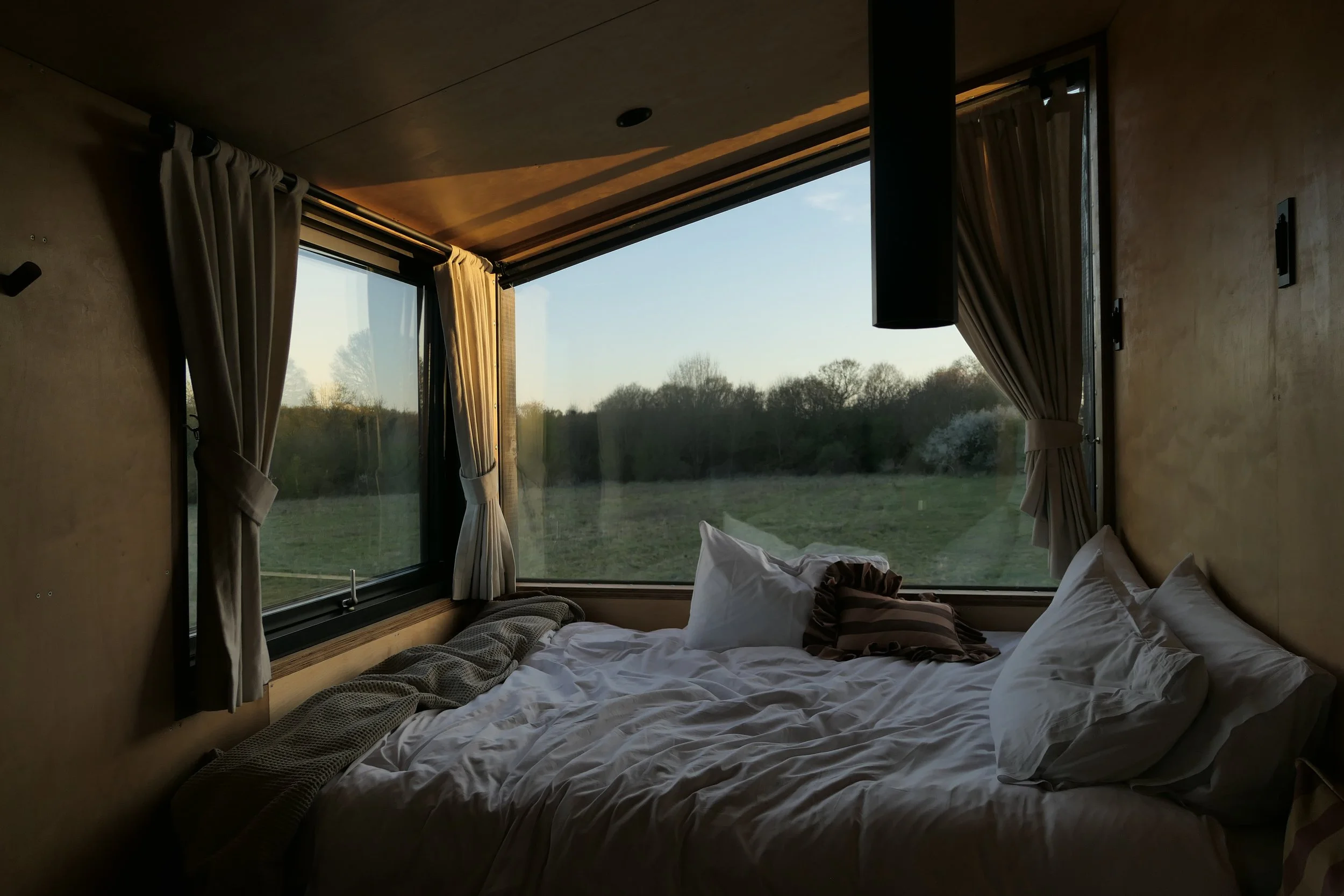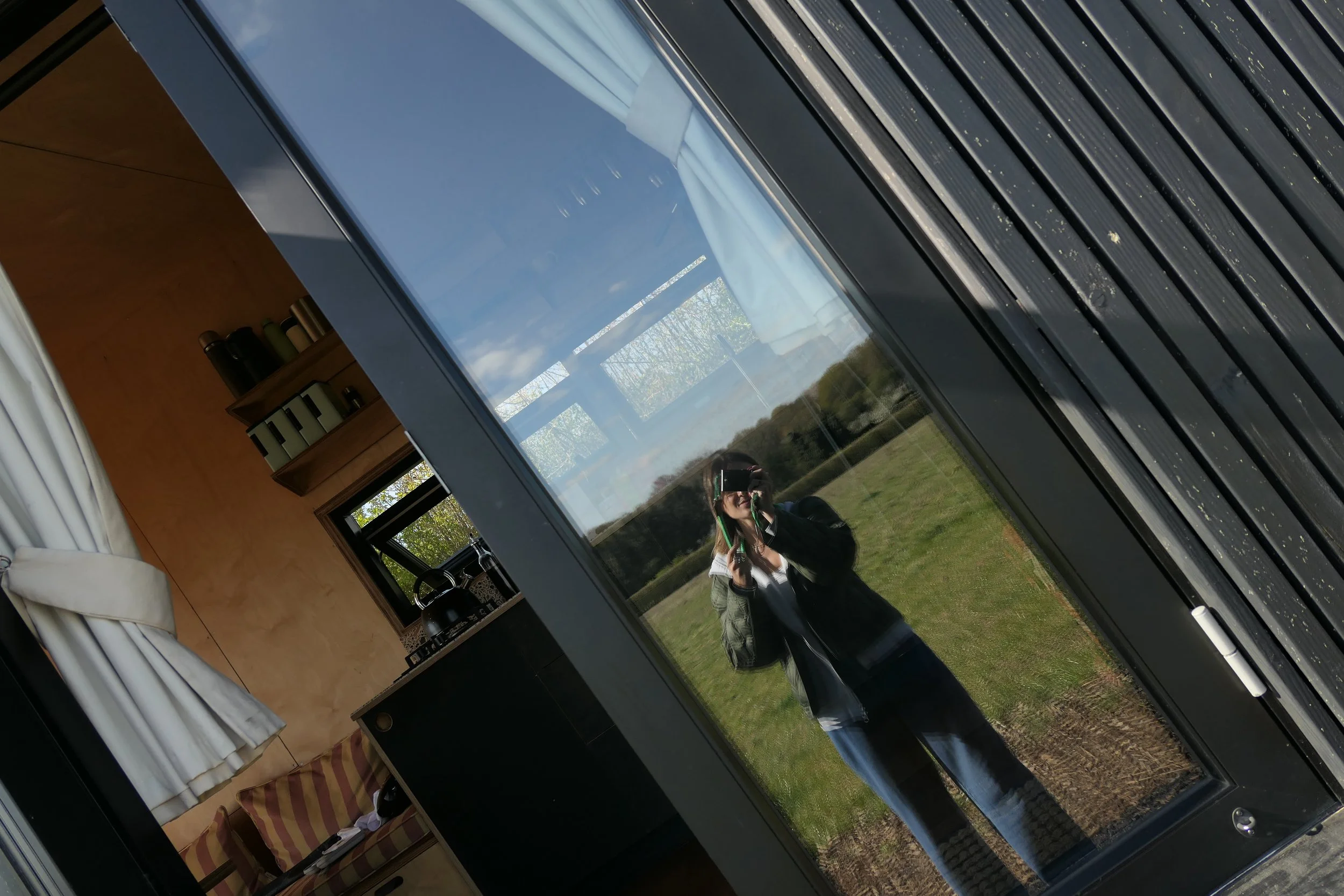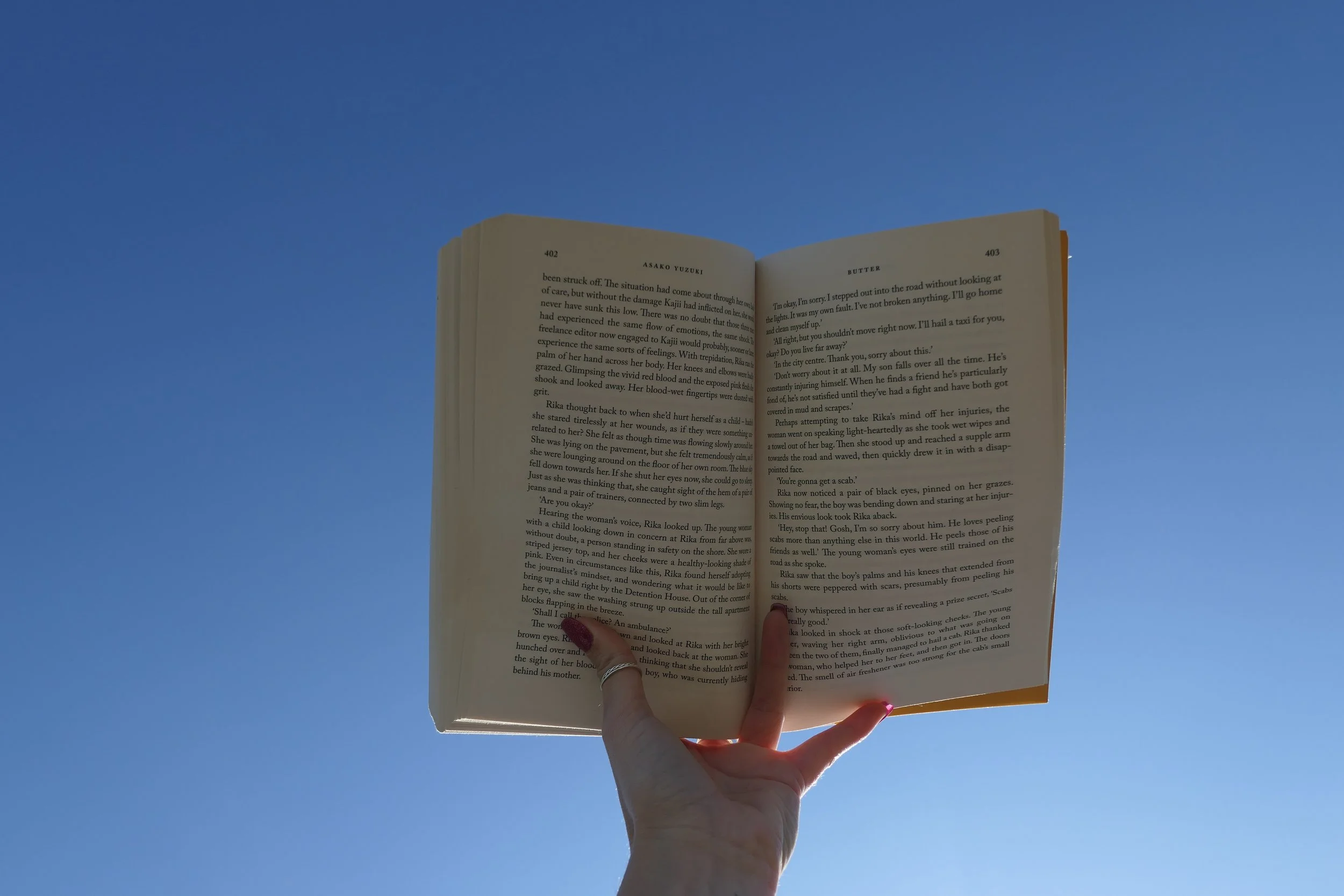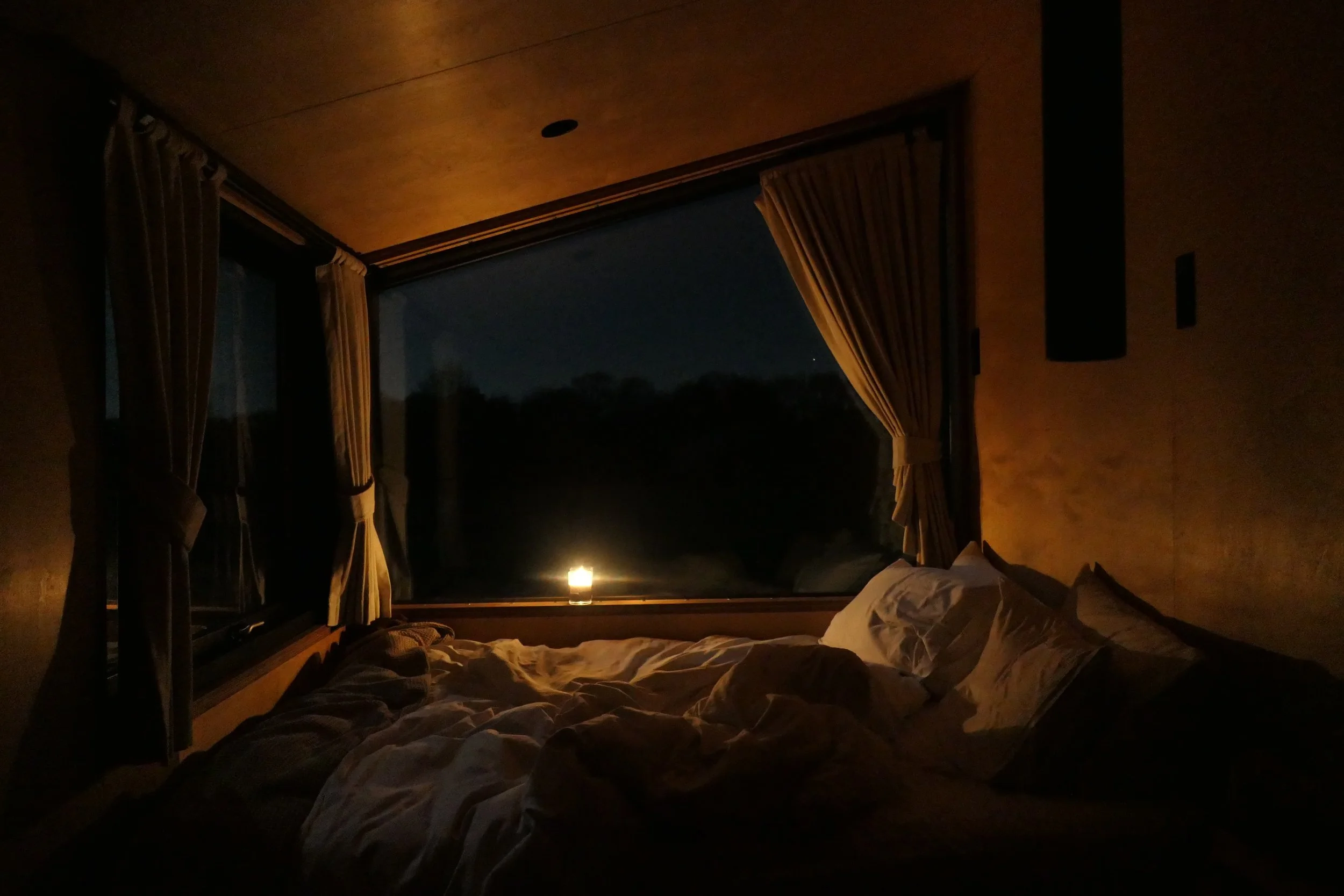Why offline is the new luxury.
Haven’t you heard? Going offline is the new luxury. The rise of offline stays, digital detoxes, going analogue and off-grid living is a trend that’s here to stay. It’s been on the up and up for years now, with digital detoxes finally getting their Hollywood moment in the latest season of The White Lotus where guests were told to hand over their phones upon entering the resort and to avoid using technology in public spaces.
We live in a society where its normal for everyone to have a phone. To have social media, emails, whatsapp, news apps, dating apps, reminders, calendars, food delivery apps, fitness apps and apps that even remind you to do your pelvic floor exercises. All sending you push notifications throughout the day, it’s no wonder we feel lost without technology whilst simultaneously overwhelmed by it.
The idea of locking up your phone might sound terrifying. To me, it sounds like utter bliss. I recently stayed in one of our cabins and whilst reading my book I noticed my phone was vibrating a bunch. I turned it on airplane mode whilst I finished reading my chapter. 20 minutes later and I came back to 175 notifications just on whastapp. I cannot tell you how overwhelmed I felt at just the thought of opening the app to see which group chat was lighting up. Turns out, it was many group chats, all talking at the same time, about different things. How on earth is anyone supposed to keep up?!
I’ll be honest, I am pretty awful at replying at the best of times. You will generally get a response only if I have my phone in my hand at the exact moment that you message. And even then it’s not guaranteed.
I’ve always had a love hate relationship with my phone.
I’ve never enjoyed the expectation that I should be available to people at all times. But, as someone who runs a business that largely gets its sales through social media, I now find myself tethered to my phone - posting, analysing what worked and what didn’t, creating (pretty lo-fi) content and juggling the DMs in our inboxes. I’m searching for and reaching out to PR collaborators and I’m desperately trying to make sure that they deliver on their content promises. My life feels ruled my instagram - yet, my business (and personal ethos) is all about switching off from all that noise, and being present with each other in nature. I find my life full of contradiction and duality surrounding how I engage with social media.
I also often find myself doomscrolling in bed before falling asleep. You’ll notice that there’s been no shortage of bad news lately. Wars rumble on, markets teeter and ice caps retreat. Doomscrolling, coined during the pandemic when new crises seemed to pop up every hour, the term describes the compulsion to trawl through endless bleak headlines on social media. Why then do we find ourselves doing this? Firstly, apps are designed to give us short lived dopamine responses that we quickly need to top up by way of a new headline, leading to a digital addiction. Secondly, it taps into a quirk of human psychology - our built-in bias for negativity.
Evolutionarily, being aware of danger helped our ancestors stay alive. Journalists have been aware of this tendency, with the old newsroom adage “if it bleeds, it leads” being born of the intuition that tales of bloodshed and chaos shift more papers than good news ever will. Individuals with a high level of neuroticism - an inheritable personality trait - appear particularly vulnerable to doomscrolling, and so too do those with a low tolerance for uncertainty, who seek definitive answers in a chaotic world.
Doomscrolling can also lead to poor mental health. With doomscrolling resembling rumination - the repetitive and unproductive dwelling on dark thoughts - there seems to be a causal link between heavy social media use and depression and anxiety.
It’s no wonder right? When we’re consuming demoralising headlines, and overly polished social media posts which feed our ‘compare and despair’ neuroticism day in and day out. Plus we have to keep up with 10 group chats, ring our parents once a week, sift through potential love interests on dating apps, track our periods, email our boss back and on and on and on it goes. Finding time for yourself in amongst being available to others 24/7 can be a mammoth task. The number of times that I will instinctively reach for my phone and feed my instagram addiction when I’d told myself I was going to read my book is too many times to count.
It makes sense then that we would be seeing the following shifts in how people prioritise their downtime.
Travel gets lit - literally booking a holiday to finish that book.
Offline travel - ditching your phones and tablets in a bid to be more present and regulated by nature, instead of your phone.
Slow travel - immersing yourself fully in the location and experience instead of moving on and constantly throwing yourself into the next activity.
Reading holidays
Let’s talk about reading holidays. Last week I stayed in our Reconnect cabin in St Albans, and genuinely my only goal for my stay was to finish my book. Finding myself constantly distracted and only ever managing to squeeze in half an hour or so maximum of reading time when I’m at home in London can make finishing a book an impossible task. Which is a shame because I find myself to be the most grounded, inspired and relaxed person when reading forms a part of my routine. Language has the ability to penetrate the subconscious in ways that consuming a reel never will.
With the wellness benefits of hobbies, and reading in particular, well-documented, it’s no surprise that a host of new reading retreats have popped up to cater to those who want to get stuck into a good book without distraction. Conde Naste Traveller quips that a good book is 2025’s ultimate status symbol.
Offline travel
Next up, going offline during travel has quite literally blown up with brands such as Samsu and Unplugged doing their best to wean you off of your devices. Or rather, hard shock yourself out of these habits by locking your phone away in a box for the duration of your stay (very White Lotus). And to be honest, we’re fully behind this as a concept. If going cold turkey is what it takes to give you better boundaries with your phone, give me a box! But, if you’re like me - I don’t want to sign up to a short term detox or short term boundaries. I want actual space from my phone to penetrate my daily habits. I want to know that my phone is there, but that I don’t feel the urge to instinctively reach for it because I’m more present in another activity, or with my own feelings. Which is why in our cabins there are no boxes, locks or keys.
It is totally up to you how you decide to engage with your phone during a stay with us. We fill the cabin with tools that help you connect to yourself, your friend or partner and to your creativity. None of these things require a phone. We hope that you’ll immerse yourself in the activity, conversation or stillness because you have the freedom to do so, not because we told you to. But we do encourage you to put your phone away, or turn it on ‘do not disturb’ to really start creating some healthy boundaries with your devices.
I’ve gone off-grid and offline many times and it always did me wonders. I checked my phone once a day for important notifications, but otherwise it’s on airplane mode. Giving myself permission to disappear for a few nights wasn’t just calming, it was also thrilling. It gave me energy to know I was existing without being perceived. That I could occupy space without worrying about whether the aestethic was instagram worthy. To occupy space without checking how other people have done it before me. To disconnect from responsibilities for a few nights.
Each time I go offline for a few nights, the way I take care of myself is different. Sometimes I want nothing more than to be still, read a book, do nothing and soak in the silence and the peace. Other times I can’t control the urge to go exploring through the woods - often with my camera in hand, being inspired by nature and the way the light shifts throughout the day. Other times I want to drink wine, soak in the bath, listen to music and dance all weekend long. The best thing about this is that I really tune into the needs of my body, and I allow myself the things I’ve been craving - which constantly changes.
There’s no ‘right way’ to be offline. Die hard analogue fans can make you feel like switching your Spotify on to listen to your favourite album on a bluetooth speaker is a crime - but trust me, it ain’t. Wind up radios and polaroid cameras are very sweet and really tap into feelings of nostalgia. But let’s be clear - they’re a prop, something that looks good on instagram. They can help you feel disconnected from the modern world we live in, for sure. But there’s a way to be disconnected from the pressures of society whilst still being connected to yourself, the music you like and the age we’re experiencing. Using modern luxuries (such as your camera app, Spotify or a bluetooth speaker) to help tap into your creativity and build resilience against the realities of life is the way that I choose to go offline. I don’t want to contact anyone, but I still want photo memories, I still want to feel creative, to listen to new and old music and experience something new, rather than only something nostalgic. I don’t want to leave feeling like I can’t replicate this feeling unless I choose to banish digital devices and lock them away in a box. I want to find a balance that suits me. Going offline in a literal sense, definitely. But embracing the good that also comes with the bad - i.e. an abundance of music at your fingertips and a never ending (sustainable) camera roll, oh and google maps so that you don’t get yourself in a pickle.
We’re also a luxury stay. The quality of everything you touch should feel like a boutique hotel room, not a camping hut. That’s what we talk about when we say to embrace offline as the new luxury. Literally offline. Literally luxury. Combined = a crazy nice sensation.
Slow Travel
Finally, slow travel is the idea that instead of rushing from activity to activity or town to town on your trip, that you embrace truly slowing down to enjoy moments of meaning in the local culture, the local people. Think fewer flights and more trains, fewer selfies and more conversations, fewer destinations and more memories. It’s about being intentional with your choices and really experiencing the journey, not just the destination.
Why is slow travel so important?
A Desire for Meaningful Experiences
After years of fast-paced, photo-op-heavy tourism, people are seeking depth in their travels. Slow travel allows you to forge connections with locals, explore hidden corners, and create memories that feel authentic.Sustainability Matters
The climate crisis is front and center, and slow travel is one way to reduce your impact. Choosing longer stays, staycations, fewer flights, and local businesses helps the environment and supports communities.Mental Health and Wellbeing
Let’s face it—traveling can be stressful when you’re constantly on the go. Slow travel lets you relax, recharge, and enjoy the journey without the pressure to “do it all.”Post-Pandemic Reflection
The pandemic shifted the way we think about travel. Many of us now value experiences that are slower, quieter, and more intentional. Slow travel fits perfectly with this mindset.
I recently spent a month in the Oaxaca region of Mexico. I booked myself a month away so that I could take the pressure off of ‘rushing’ around. I wanted to explore slowly, to see through un-rushed eyes and to discover without an agenda. I did move between places, but only after I felt like moving on. Not with any pre-planned itinerary or accommodation booked in advance. I then revisited the places that were calling for me to return to, and each time I saw something new. I feel so lucky and blessed to have been able to make that time for myself.
Another important note about this trip is that I booked it solo. I did in the end have friends join me, but because I had originally planned to go alone, they were very much joining my trip and agreeing to take it in the way that I had planned - which was with no plan at all. I got talking to strangers when eating dinner alone at the bar. I made friends with people that I’d never normally cross paths with. I had conversations with strangers that were more open and vulnerable than those I have with my oldest friends. Locals taught me things that I could never learn in London. I didn’t just observe cultural differences, I experienced them.
Slow travel is quite strongly linked to slow living. A concept that has been garnering lots of attention lately, with people packing up their small flats in the city and trading it in for a farm in the country. Learning to live off the land, be outside more, be more intentional with time spent. Everywhere I look someone is documenting this move on instagram or tik tok. But, slow living isn’t an aesthetic. Slow living isn’t always comfortable and serene. The internet romanticises it - all linen, golden light and homemade jam. But slow living is actually uncomfortable. It invites you to sit with what we usually rush past. To choose rest when hustle would be easier. To move more slowly, more honestly, when everyone around us is living a hurried life.
A lot of people say they want rest, presence, space - but when we get it we squirm. We reach for our phones. We make another to-do list. We fill the quiet. It can be deeply uncomfortable to just sit with ourselves. Our nervous systems have become addicted to fast living - to urgency, to output, to noise. But the discomfort that comes with slow living isn’t a sign that something is wrong. Its a sign we’re breaking the cycle. That’s what healing often feels like: Awkward. Clunky. Unfamiliar.
Slow living isn’t an aesthetic. Sometimes it means doing the hard, unseen work of: resting without guilt/ trusting the seasons of life/ untangling self-worth from productivity/ saying no/ learning to feel safe in slowness/ choosing presence over performance/ letting yourself fall behind/ allowing space for boredom/ sitting with uncomfortable feelings rather than rushing to numb them/ trusting that productivity ebbs and flows/ letting go of what isn’t yours to carry/ seeking meaning over mindless momentum, even when the world rewards the opposite.
It’s no wonder that the coolest people online, are the ones barely posting. In a world where oversharing has become the norm, a quiet counterculture is emerging: the rise of digital minimalism. Digital minimalism understands that maybe the ultimate power move is to post less.
I appreciate the irony in sitting here, writing a piece for online consumption about how offline is the new luxury. But, unfortunately nobody reads the flyers posted through letterboxes anymore. And the internet is definitely a useful tool, especially for small businesses like ours. So, I accept what I cannot change - that the internet is required for me to market my business. And I embrace the things that I can control - how I spend my time - both online and offline. I show up online mostly to help others visualise how to be offline. And I spend the rest of my time offline, creating art in nature as often as I can manage, embracing slow travel and reading lots of books. And now, I often find myself experiencing JOMO (the joy of missing out). I don’t mind that I don’t know what you’re chatting about in the group chat, I know that the important things find me when they should. And that otherwise I’m actually enjoying and experiencing life, feeling grateful that I’m no longer rushing for other people.
Written by Monica Innes - 15 April 2025







